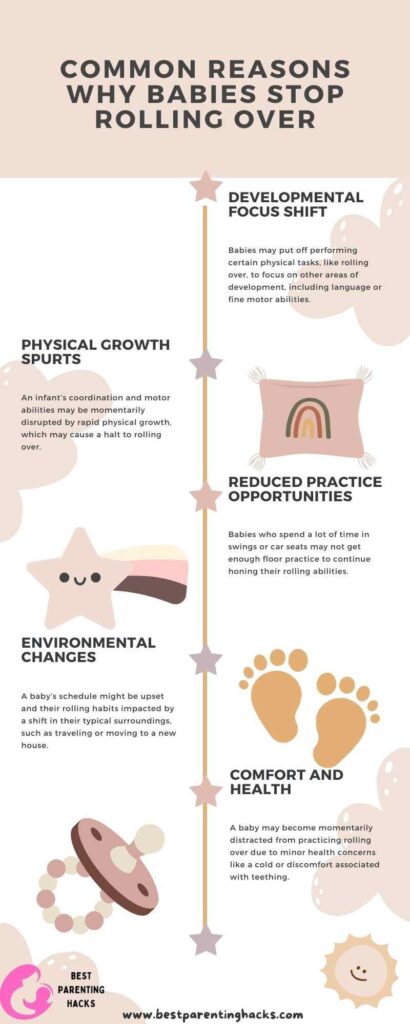Table of Contents
As a mother I have witnessed milestones in my child’s development and every single one of them has stirred within me a unique blend of excitement and concern. My infant rolling over for the first time was one of the most unforgettable milestones. I felt proud and like I accomplished something at that time. But there are surprises in parenting every step of the way. Just when I thought we were getting the hang of one, my baby stopped turning over. This abrupt alteration prompted me to investigate the origins and mechanisms behind these developmental transformations.
Regarding the query stated in the headline, “My Baby Forgot How to Roll Over. The response to questions like “What’s the reason?” isn’t always clear-cut. I’ve discovered from my study and experience that there are several possible causes for this halt in rolling over. It may be a normal aspect of their growth process when they put new skills first and momentarily ‘forget’ old ones. Alternatively, it might be impacted by environmental variables, physical maturation, or even a brief period of regression. Any parent going through this time has to understand these reasons.

Common Reasons Why Babies Stop Rolling Over
Babies frequently quit performing something they’ve mastered in an instant, like rolling over. Parents may find this situation perplexing and potentially alarming.
1. Developmental Focus Shift: Babies may put off performing certain physical tasks, like rolling over, to focus on other areas of development, including language or fine motor abilities.
2. Physical Growth Spurts: An infant’s coordination and motor abilities may be momentarily disrupted by rapid physical growth, which may cause a halt to rolling over.
3. Reduced Practice Opportunities: Babies who spend a lot of time in swings or car seats may not get enough floor practice to continue honing their rolling abilities.
4. Environmental Changes: A baby’s schedule might be upset and their rolling habits impacted by a shift in their typical surroundings, such as traveling or moving to a new house.
5. Comfort and Health: A baby may become momentarily distracted from practicing rolling over due to minor health concerns like a cold or discomfort associated with teething.
You Might Also Like to Read: Will My Baby Forget Me If I Leave for a Month?
Understanding Baby’s Developmental Milestones
Every baby’s developmental path is intriguing and different. Babies usually begin rolling over at 4 or 6 months of age. Their improving motor skills and muscle strength are reflected in this accomplishment, which holds importance. However, it is vital to remember that each infant develops at their own pace. While some people may reach this milestone sooner than others, others may need a little more time. Parents must recognize and value these distinct characteristics.
1. Physical Growth: A baby’s capacity to roll over may be impacted by their physical development. Their body proportions alter as they become bigger, which may momentarily impair their rolling abilities.
2. Muscle Development: Rolling over is significantly influenced by the growth of the limb and core muscles. It takes time for babies to develop the essential motor skills and coordination.
3. Neurological Development: Another important consideration is brain growth. Babies learn to coordinate better and regulate their motions as their brains develop.
4. Practice and Environment: A baby’s ability to roll over may be influenced by both the quantity of practice and the kind of environment they are in. It’s important to have lots of room and a floor play area.
You Might Also Like to Read: Is It Okay to Leave Baby with Grandparents for a Week?

When to Worry and When to Wait
It’s normal for parents to get concerned when their child loses the ability to perform a task they used to perform easily. It’s crucial to distinguish between a developmental stop and a possible cause for concern, though.
1. Lack of Other Developmental Progress: It may be time to see a pediatrician if your child is not making progress in other developmental domains.
2. Physical Discomfort or Pain: It’s crucial to get medical help if your infant exhibits symptoms of discomfort or pain when trying to turn over.
3. Extended Period of Regression: If your child has been struggling to roll over for an extended amount of time, especially if they were previously proficient at it, you should speak with your doctor.
4. Changes in Activity Level or Mood: Notable shifts in your baby’s general level of activity or mood may be a sign of underlying problems.
5. Lack of Interest in Movement: If your infant generally seems uninterested in exploring or moving, it may be time for more testing.
Helping Your Baby Get Back on Track
There are several methods to assist your infant in regaining the ability to roll over if they stop doing so.
1. Encourage Floor Time: Make sure your infant spends enough time on the floor to learn how to roll over and move.
2. Use Motivational Toys: To get your infant to move and roll toward toys, put them just out of reach.
3. Create a Safe Environment: Ensure that your infant may roam about and explore the space securely and comfortably.
4. Be Patient and Supportive: Keep in mind that each baby develops at a different rate. Encourage and support them without putting pressure on them.

Parental Tips and Tricks
Here are some suggestions based on my own experience that may assist get your baby to turn over once more.
1. Routine and Consistency: Restarting your baby’s rolling can be facilitated by creating a schedule that involves frequent floor play.
2. Engage and Interact: Play on the floor with your infant, modeling the roll for them and encouraging imitation.
3. Limit Time in Baby Gear: Cut down on the time your child spends in car seats, swings, and bouncers.
4. Monitor Physical Development: If you have any concerns about your baby’s general physical development, talk to your physician.
5. Stay Positive and Relaxed: Your infant is sensitive to your feelings. Maintain a cheerful and carefree demeanor to foster a favorable learning atmosphere.

Conclusion
In conclusion, even though your infant stopping rolling over might be worrisome, it’s usually only a passing stage in their growth. I’ve discovered as a parent how crucial it is to be patient, to pay attention, and to comprehend the individual growth patterns of each child. Recall that each milestone—whether reached early, on schedule or a little bit later—deserves to be celebrated on its own. Savor every developmental stage of your baby’s growth, and know that they will continue to flourish and grow in your love and care.
FAQs
1. Why is my infant no longer rolling over?
• Developmental emphasis shifts, physical growth spurts, less practice changes, environmental changes, or minor health difficulties might all cause babies to momentarily cease rolling.
2. If my six-month-old infant isn’t turning over, should I be concerned?
• Some newborns turn around after six months, while some take longer. Keep an eye on their general growth and get advice from a physician if you have any concerns.
3. How can I get my infant to roll over once more?
• Promote floor time, utilize toys that inspire, set up a secure setting, and show patience and support.
4. Is it common for infants to lose the ability to turn over?
• That is typical, yes. Babies may “forget” for a while as they concentrate on reaching other developmental milestones.
5. Can my baby’s ability to turn over be impacted by the surroundings?
• It’s true that their capacity to exercise rolling may be hindered by a lack of room or an extended stay in a container.
6. What are some indicators that my child’s growth warrants a visit to the pediatrician?
• If your child exhibits symptoms of discomfort, fails many developmental milestones, or exhibits notable fluctuations in activity, get in touch with a physician.
7. What is the duration of the non-rolling-over phase?
• Every infant experiences this differently. Several days to several weeks may pass, based on several variables.




